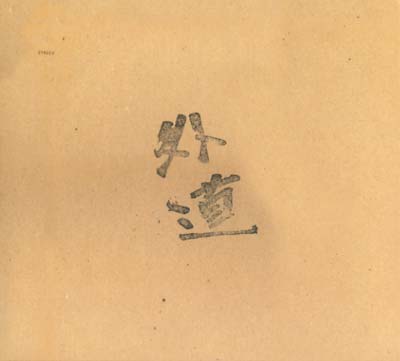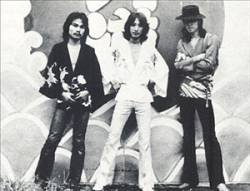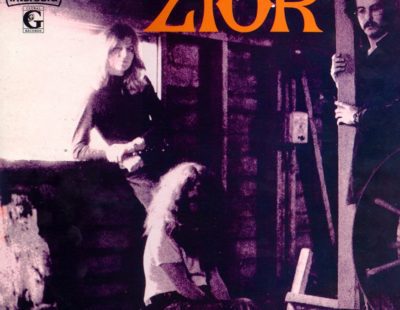
Primitive Origins is a column where we’ll look back at proto-metal and early metal that deserves a bit of your battered eardrum’s attention. We’re keeping it loose and easy here: there’s no strict guidelines other than it’s gotta be old, it helps if it’s obscure, and it’s gotta rock out surprisingly hard for its context. Pscyh-ed out proto-metal from the late ’60s? Of course. Early attempts at doom metal from the ’70s? Hell yeah. Underground Soviet metal from the early ’80s? Sure. Bring it on. Bring it all on.
We’re getting pretty obscure here, Gedo being a band that was only recently put on my radar by a fellow proto-metal explorer, the Japanese group delivering a totally raucous racket on their 1974 debut, which we’ll look at today.

The fact that this album is a live album only furthers the confusion I feel when trying to find info about Gedo; there’s not much about the band out there. But, man, talk about a live album actually working, the production just bleeding in all the right spots, the open hi-hat driving the band’s high-energy sound along. They crash and bash like MC5, the band’s tight, focused delivery veering more proto-punk than proto-metal at times, but the energy is definitely up there with the thrashiest of proto-metal of the era, and, indeed, rivals some of the most energetic bands of today.
“Scent” opens things up and, wow, talk about a memorable song, the trio getting the audience worked up in a huge way right off the bat with this concise, smartly written proto-metal rocker. If you go no further in your Gedo explorations, you’ll surely be happy you at least stopped to spend some time with this excellent, catchy, off-the-charts punk blitz. Stop everything and listen to this song now.
“Don’t Run Away” is next and, surprisingly, drops things down to a huge sludge, the band laying down riffs that Sabbath circa ’74 would certainly be happy enough to have written, those drums, again, leading the way as the other two members lumber through this very heavy tune. Massive metalhead appeal here. “Gedo” the song is next, a shorter rocker that brings to mind KISS’ poppier mid-’70s moments; again, had more longhairs heard of this band, especially back when this album dropped, songs like this would have been personal anthems, assuming the language barrier wasn’t too insurmountable. But, that riff!
The awesomely named “Rock ‘N’ Roll Stupid” is next, and, yeah, it’s pretty stupid, the band taking on old rock and roll sounds in a way that we just never need to hear when mining for proto-metal gems. Luckily, it’s short, but, still, I’ll be sipping a soda at the pop shop with Archie while this one bops on past.
The curious “Dance Dance Dance” is next, the band dragging it out for seven minutes, and while it’s hard to tell exactly what is happening here, one thing is for sure: the proto-metal levels are dipping as we enter the mid-point of this album, a very common occurrence for proto records of the era: my theory is that the bands often either started heavy then explored other genres (often, I can only surmise, at the request of label execs) or threw on their earlier, less heavy material to fill up the album. Regardless, while the heavy factor falls, the energy levels remain high, as that extremely dominant bass line propels things forward, and a drum solo… well, it’s a drum solo, not sure what to expect or say about that, but that’s why the damn song is so long.
“Byoon Byoon” is up next, and the band goes back to their tight, concise rockin’ sound here, the riff compact and urgent, the chord changes very rock ‘n’ roll, but the vibe approaching proto-punk, taking the sounds of the previous generation of loud music and making it their own, Gedo laying down a fun quick one here.
The band then slows things down for “At the Usual Place,” again taking classic chord changes and melodies and creating what approximates a sentimental bubblegum ballad played by guys who—you can tell—just are itching to take it up a few notches. Held together at the seams, barely; the drummer can barely contain himself back there.
As if there’s any doubt that proto-punk was raging through Gedo’s veins, the next song is called “Rotten Life,” and the band goes hard here, delivering another tight, high-strung rocker that flirts with punk economy and metal heft, the former winning out slightly but the determination with which the song is delivered makes it lovable for metal fans as well. Can I give one more shout-out to the drummer? Love listening to him rockin’ out hard throughout this whole album.
“Completed” hits hard next, the band keeping the energy levels at an appropriate high for the final third of this cool album, the song actually reaching peak Gedo frenzy by midpoint, the band absolutely going for pure rock glory here, and attaining it. “Tender Betrayal” slows things down for a full-on acoustic dirge, and it ain’t half bad; the record then ends off with the crazed sounds of motorcycles revving up, horns honking, and tires peeling out, an appropriate ending, given that the band was apparently big with bikers in Japan.
This album is worth getting to know, the live production and energy absolutely working in Gedo’s favor, some of the proto-metal, doom, and punk sounds here being some of the greatest we’ve explored in this column, if we’re getting down to brass tax. Plus, it works as more than a curiosity, Gedo crafting songs here that may not have been anyone’s anthem in 1974 but may become mine for at least a small part of 2019.
Gedo’s Gedo – The Decibel breakdown:
Do I need to be stoned to listen to this?: Nope.
Heaviness factor: It’s more raw and careening proto-punk than anything approaching Sabbatherian, but the off-the-charts energy here surpasses lots of bands we’ve discussed in this column, and they do get doomy and heavy now and again.
Obscura Triviuma: The band’s name is also translated sometimes as Gedou.
Other albums: Yup, a bunch of ’em.
Related bands: Too Much (yes, the band is called Too Much).
Alright, fine, if you must: I’m drinking a beer as I write this and it’s working out decently enough, so, crack a beer.






